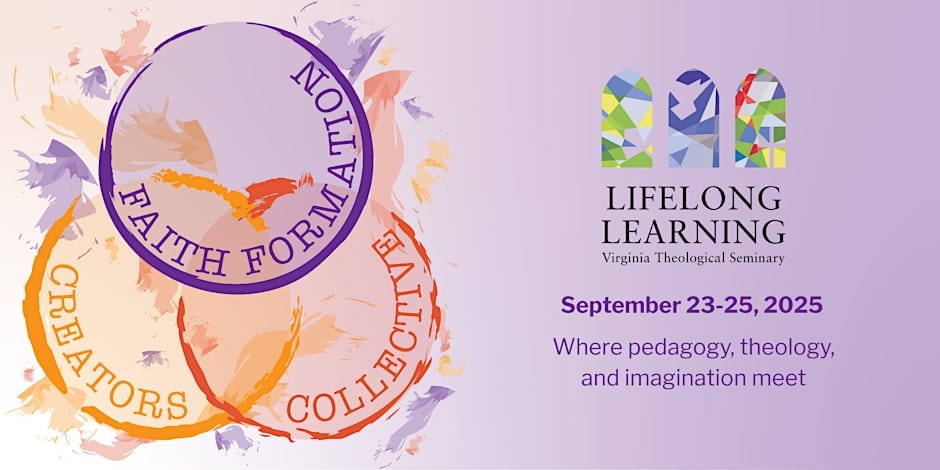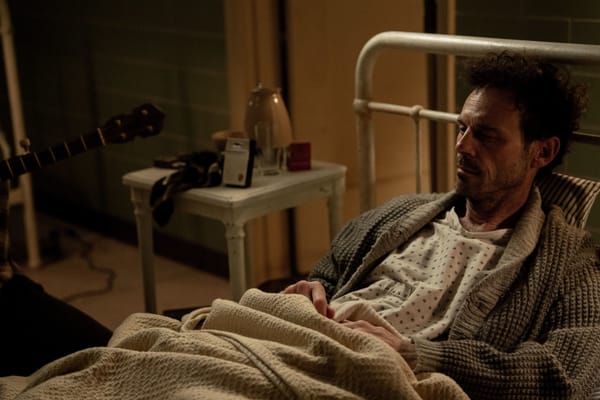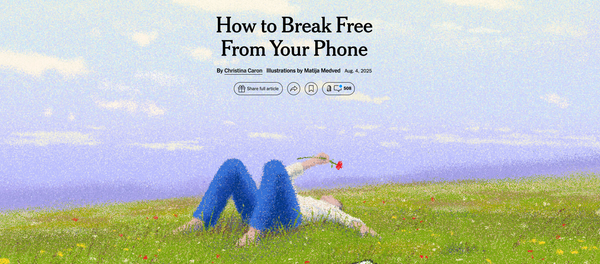Friday Recs: Interesting convergences
A great new event, a surprisingly mainstream spiritual convo, and more

Faith Formation Creators Collective
I wanna start this weekly resource roundup with an exciting announcement. I'll be giving a plenary and a workshop at a new event hosted this fall by Virginia Theological Seminary.
The Faith Formation Creators Collective is a virtual mini-conference that brings together creative minds and faithful hearts to explore where pedagogy, theology, and imagination intersect.
Crafted for those immersed in the work of faith formation—those writing, designing, adapting curriculum and resources, and dreaming of what comes next—daily interactive plenaries and workshops will enable attendees to learn from scholars and practitioners, immediately reflecting on their learning in individual or group settings.
I was involved a bit in the design of this gathering, and I'm really excited about the contributors and workshop lineup. I hope you'll join us September 23–25!
'Why Does My Mind Keep Thinking That?'
I had a lovely conversation Wednesday with my friend Wendy Barrie, one of the first formation leaders I got to know when I started in this field in 2012, and she said something that has stuck with me. I'm paraphrasing a bit, but the gist was
The Church has really fabulous resources for people talking about life and death. Thriving faith communities aren't doing new things; we're doing old things with intention. And the world really needs the wisdom we have to share.
I'm more convinced than ever that this is true. Of course, it's not a new idea that ancient spiritual practices are the engine of authentic flourishing in mainline congregations. We are, after all, approaching the twentieth anniversary of the publication of Christianity for the Rest of Us.
But if seems to me like secular culture is starting to get the hint in new ways about how this wisdom can ground us in difficult times. It might just be the thinkers I follow most closely, but conversations I'm used to hearing in faith circles seem to be breaking out into surprising places.
For example, I really enjoyed Ezra Klein's recent conversation with Buddhist psychotherapist Mark Epstein. So many echoes here of the conversations and sensibilities that have shaped this week's posts here at A (Christian) Formation Playbook.
Against the backdrop of reminders that we are not our thoughts and other contemplative insights, I especially appreciated this take on how traditions like therapy, spiritual direction, and other forms of personal meaning-making complement mindfulness and meditation:
Taking the story — one’s own personal story — seriously is super important. And there’s a real tendency among people who don’t have a psychotherapeutic interest but are coming strictly from the meditative point of view to diminish the importance of everything we’ve learned from a hundred years of psychotherapy: Early childhood experience, emotional pain, even traumatic events — those are all just phenomena to be observed. Don’t make too big a deal.
I think that’s a mistake. I think we need to take ourselves seriously and understand ourselves as best we can, and then begin to loosen the attachments that we all have to the various events that have formed us.
From the spiritual side, freedom from identity is the goal. And we can see what happens in the world when people are unable to free themselves from their identity. It’s a big cause of conflict and pain. But those identities are super important to be able to make sense of, too. So that’s one of the ways that I see these two worlds really helping each other.
Wanna Chat?
My recent conversation with Wendy was in response to the invitation to all of you for us to connect. (Thanks, Wendy!) So far these chats have been informal and generative and just really life-giving for me—I hope for my colleagues too.
I'd love to hear about what you're up to, what you're hoping to see in this newsletter, even ways we could work together if you think the Spirit might be cooking something up.
Please consider getting in on the action!
Two slightly more specific invitations: I'm returning to doing some coaching in Christian formation and/or digital ministry leadership. If you think you might benefit from a conversation partner in your practice, I'd love to explore that further. Happy to send my 2025 rate card or info about my coaching philosophy.
I'm also preparing to begin a spiritual direction training program this fall—and I know I'm going to need to connect with two directees for a supervised "student teacher"-style direction experience throughout 2026. If you or someone you know might be search of a spiritual companion right now, and if you think I'd be a good fit, I'd love to hear from you as well.
Faith+Lead x Christian Smith
I don't always agree with some of their premises, but I do believe Faith+Lead at Luther Seminary doing fabulous work, providing "of the moment" public intellectual leadership (in terms of both topics and execution style) that is practically in a class by itself among mainline seminaries.
Hosts Dwight Zscheile and Terri Elton recently interviewed Christian Smith about his new book, Why Religion Went Obsolete. I want to come back to this conversation and book, but I haven't found an occasion yet and I didn't want the episode to get too stale before sharing:
What this book is trying to do is to say, wait a minute, step back out to the macro level. Look at the big picture. And it's not just you ... There are plate tectonic, titanic forces at work, technologically, in geopolitics, in economics, that are driving this stuff. People on the ground in congregation, religious workers, are trying to make sense of it ...
One of the threads of the argument in my book is that traditional religion is kind of stuck with or refuses to let go or doesn't know it needs to figure out. It's kind of stuck with cultural forms that may be totally legitimate and in an era they were fabulous, right? But in the, in the new zeitgeist, they just don't fit. There's a mismatch.
Seems to me the interview pairs well with the most recent episode, "What Early Believers Can Teach Us About Cultural Engagement."
'Why Do So Many People Think Trump Is Good?'
I have often found David Brooks a little curmudgeonly and sometimes tonedeaf, but in our current cultural and political moment his comments are frequently resonating with me.
So here's another one of those columns (gift link!) that feels half like something Iave read in seminary rather in The Atlantic. (Warning, a small amount of enlightenment bashing here, which, largely, 🙄.)
How do people make decisions about the right thing to do if they are not embedded in a permanent moral order? They do whatever feels right to them at the moment. MacIntyre called this “emotivism,” the idea that “all moral judgments are nothing but expressions of preference, expressions of attitude or feeling.” Emotivism feels natural within capitalist societies, because capitalism is an economic system built around individual consumer preferences.
One of the problems with living in a society with no shared moral order is that we have no way to settle arguments. We have no objective standard by which to determine that one view is right and another view is wrong. So public arguments just go on indefinitely, at greater levels of indignation and polarization. People use self-righteous words to try to get their way, but instead of engaging in moral argument, what they’re really doing is using the language of morality to enforce their own preferences.
See you next week! Unless something changes, I'm planning to cover the great formation vs education debate. Have a great weekend.



